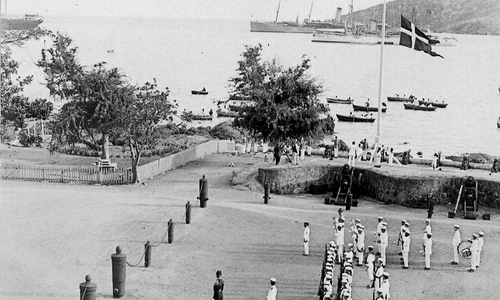
The communist collapse of 1989
The greatest surprise of 1989 was how fast the European communist regimes collapsed. No one saw it coming, this fall of dominoes in Eastern Europe. The failure of communist regimes had become obvious long before 1989, but nobody – specialists, westerners, people from the communist countries and not even dissidents – thought that the last decade of the 20th century would get to know a communist-free Europe.
For many, it is enough to explain to fall of communism through its lack of legitimacy. „These regimes were illegitimate from the start and their fall was to be expected” – this argument, even though it is somewhat legit, is not enough. Yes, the European communist regimes were illegitimate, but they still manages to survive for 40 years. And then, why was it that in the 1980s, these regime came toppling down, one after the other? According to specialists, the main reason was the economic failure, obvious not only to the public, but also to the communist leaders themselves. We add to this causes of political, geopolitical, social and ideological nature.
Regarding the regime’s illegitimate nature, the argument is valid only on a theoretic level:with only one exception, that of Czechoslovakia, the communists got hold of power through falsified elections and soviet threats. But, in fact, all European communists regime were, in a few years, accepted by the population, thus winning some sort of legitimacy. In most cases, it was an economical legitimacy, gained through satisfying the population’s material needs. The best example is Kadar’s Hungary. After the repression that followed the Hungarian Revolution of 1956, Kadar initiated a reform plan that revitalized the Hungarian economy. In a few years, Kadar’s image wasn’t that of the man who had betrayed the country in favour of the Soviets, but that of a reformer who guarded the people’s welfare and prosperity.
A few theories on the fall of communism
Historian J.F. Brown has identified six main causes of the communist collapse. The first, and most important cause, was the general failure of the European communist regimes:a continuous failure of 40 years, a failure that ended up emphasizing the incompatibility between USSR’s interests and the national aspirations of the Eastern states.
The second cause is a direct consequence of the first:the general failure, particularly the economic one, emphasized the communists’ illegitimacy. They could no longer keep their promises of social harmony and economic prosperity. Also, the economic failure stimulated and helped consolidate the opposition and united the population against the regime. Intellectuals, students and workers ended up being disappointed with the regime and started to contest it.
A fourth cause would be that the communist elite, provoked by the opposition and intimidated by its failure, lost the confidence in its own ability to lead and, most importantly, the will to use violence in order to keep its political position (like they did in 1956 or 1968). The last two causes are linked to external factors:first, the improvement of relations with the West and, secondly, the impact of the reformatory wave coming from Gorbachev’s USSR. This new leader in Kremlin, through his new vision, disheartened the communist conservatives in Eastern Europe, and paralysed their actions by denouncing the Brezhnev doctrine. The communist leaders in Prague, Bucharest, Berlin and other Eastern capitals didn’t know how to handle a liberal soviet leader who wanted to change the system they tried so hard to protect (”so the East European conservatives bargained for everything except a liberal Soviet leader”).

If Brown’s explanation considers several factors, other historians have preferred to focus on only certain causes. Robin Okey, for example, emphasizes the importance of the loss of legitimacy. According to Okey, the regimes’ legitimacy was lost in stages, somewhere along the four decades of communism. First, the communist regimes lost their moral legitimacy, through the Stalinist abuses that showed the communist ideology isn’t morally superior, like its leaders claimed. The next to disappear is the political legitimacy, through the soviet interventions in 1956 and 1968:these showed that the independence and sovereignty of communist states is a mere illusion, and that Eastern Europe was nothing more than a victim of soviet imperialism. In the end, the economic legitimacy was also lost. If they had been able to support their socialist economies, the communist regimes would have survived somehow. But the moment that the economic failure becomes obvious, together with the idea that the system is not in any was salvageable, their fate was sealed.
Okey analyses the fall of communism starting with a theory regarding a system failure. This process has two simultaneous phases:first, a build-up of will and/or power of the led people to contest the status-quo’s legitimacy. This brings an upsurge of opposition movements. In parallel, we have a decrease of will and/or power of the communist leaders to keep the status-quo, which translates into a hesitation to use force against the opposition. This is what happened in the communist countries in Europe in the 1980s:the opposition and civil society continues to develop and gains more and more strength, and the communist leaders no longer know who to deal with it without the use of violence. And in the end, they give in (with one exception:Ceausescu’s Romania).
Romanian political scientist Vladimir Tismaneanu thinks that this capitulation of communist elites can be explained through the fact that even they had lost all confidence and hope that the system can be saved. Confronted with serious economic problems and with the radical changes in Moscow, the communist leaders no longer considered the ideology to be a source of inspiration and motivation. And once they lost the ideological commitment, they had nothing to count on and no reason to use violence in order to save a system they no longer believed in.
















